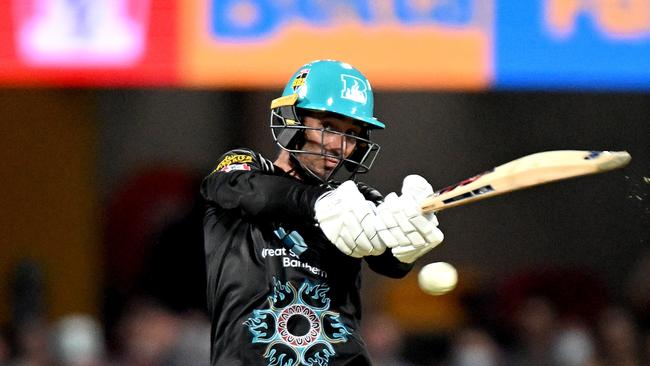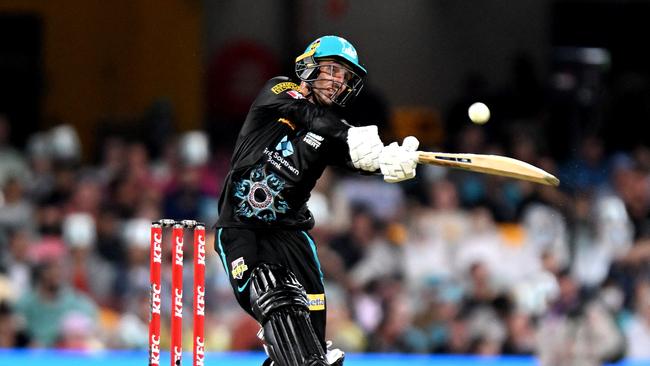Channel 7 shines spotlight on Brisbane high school teacher in bid to blow up TV deal with Cricket Australia
Channel Seven has identified seven players it considers not of a high enough quality for the BBL as its bid to terminate its TV rights deal with Cricket Australia threatens to explode.

Cricket
Don't miss out on the headlines from Cricket. Followed categories will be added to My News.
A Brisbane school teacher has become Exhibit A in Channel 7’s claim that the network may have lost $20 million a year due to a Big Bash League which is second-rate.
As part of an explosive bid to terminate its TV rights deal with Cricket Australia in the Federal Court, Seven has identified the names of several unheralded cricketers, called into the BBL as Covid emergencies last summer, who they insist put Cricket Australia in breach of its $450 million contract.
Called up to fill the void left by a Covid outbreak, Brisbane Heat players Jack Clayton and Will Prestwidge are categorised by Seven as “rookie state cricketers”, while Lachlan Pfeffer is described simply as a “schoolteacher” in the explosive Court action which has rocked Australian cricket.
Similarly, Melbourne Stars fill-ins Patrick Rowe and Charlie Wakim are respectively bracketed as “grade cricketer out of contract with Victoria” and “Tasmanian grade cricketer”.
Watch Australia’s Tour of Sri Lanka. Every T20, ODI and Test Match Live & On-Demand on Kayo. New to Kayo? Try 14-Days Free Now >

Seven are adamant the players were not of a high enough quality for the BBL to meet the standard provisions stipulated in CA’s TV rights contract.
The network claims CA breached its contract to “include players of a quality and standard not suitable for matches of at least the highest quality and standard in the world.”
However, what constitutes an up-to-scratch BBL player might be hotly contested in court, with cricket sources pointing to the fact Ipswich high school PE teacher Pfeffer was in fact a fully contracted player for Queensland last summer and grade cricketer Wakim part of Tasmania’s full-time squad.
Cricket Australia has already declared it will defend Seven’s claims vigorously in Court, standing by the fact it delivered all BBL matches despite the ever-changing landscape of trying to stage a competition in the midst of a pandemic.
Seven argue these Covid-affected BBL games shouldn’t have taken place if so many Australian stars were absent and unheralded players were having to be called in.
“Cricket Australia organised and conducted the 2021-22 men’s BBL tournament in a manner which permitted or required (teams like Brisbane Heat and Melbourne Stars) to field a team …. Which: a) did not include available Australian players suitable for matches of at least the highest quality and standard in the world … and b) included players of a quality and standard not suitable for matches of at least the highest quality and standard in the world,” Seven wrote in its statement of claim.

There was a certain charm in the early years of the BBL seeing a grade cricketer play among the greats, but grade cricketers playing amongst state cricketers is a completely different vibe.
Cricket Australia has introduced an international player draft for this season and is working hard to carve out a window which would increase the prevalence of Australian stars being available to play in the BBL.
However, Seven’s Court action is based on a belief these moves should have already been in play.
Seven argues it has lost advertising revenue and suffered other loss and damage because of the BBL failing to meet the terms of the TV rights deal which dictate that the competition should be at least the equal standard of a best in the world benchmark.
“Seven’s loss will be quantified in an expert report,” Seven wrote in its statement of claim.
News Corp understands Seven believe their losses could be in the vicinity of $20 million a year, largely because the Big Bash has lost its “halo.”
“By reason of the Quality and Standard Breaches, Seven has suffered loss and damage,” the statement of claim says.
“Direct loss of revenue for advertising sold during cricket broadcasts.
“Loss of the “halo” effect typically derived from premium programming, particularly of major sports, generating increased audience and therefore advertising revenue for other programming, whether shoulder programming (programming immediately before or after) or other programming supported by the “tentpole” of premium sports programming as well as for the premium programming itself.
“Seven’s loss will be quantified in an expert report.”




